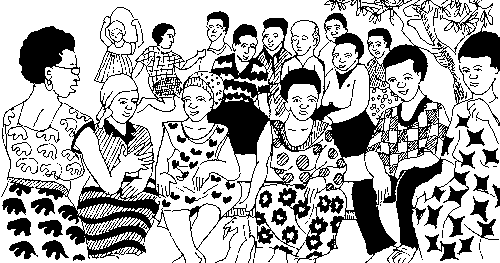Tweet
Translations:
'العربية / Al-ʿarabīyah
Bahasa Indonesia
Català
中文 / Zhōngwén
Español
Filipino/Tagalog
Français
हिन्दी / hindī
Ελληνικά / Elliniká
Italiano
한국어 / Hangugeo
بهاس ملايو / Bahasa Melayu
Português
Română
Српски / Srpski
Tiếng Việt
اردو / Urdu
Other formats:
Other Pages:
Modules
Site Map
Key Words
Contact
Utility Documents
Useful Links
GENDER ISSUE NOTES FOR PARTICIPANTS
by Phil Bartle, PhD
Workshop Handout
Gender topics to jog your memory; for discussion purposes
Gender is Not Physical:
Sex is physical; gender is social.
Biological characteristics (size, shape, colour, hair, genitals) are transmitted through genes as part of sexual reproduction. Social characteristics (attitudes, beliefs, behaviour, laws, language) are transmitted through symbols as part of communication and learning.
What is right or wrong for masculine or for feminine is learned (and can be unlearned).
The Economic Issue:
If a group (organization, community, society) systematically excludes fifty per cent of its population from participating in economic activities, then more than fifty per cent of the potential value of the economic system is lost.
An economy will improve if both men and women are included.
The Political Issue:
If a group (organization, community, society) systematically excludes fifty per cent of its population from participating in political decision making (on decisions that affect the whole), then the political system will be weaker.
A political system will improve (more creativity, a wider range of possible solutions) if both men and women are included, and thus the organization, community or society will be stronger.
The Technological Issue:
If a group (organization, community, society) systematically excludes fifty per cent of its population from participating in the technology (inventions, tools, capital) then the technical dimension will be weaker.
The technological base will be wider (more creativity, a wider range of possible solutions) if women are included, and thus the organization, community or society will be stronger.
The Human Rights Issue:
All persons have a right to fully participate in civil society regardless of their race, culture, creed, religious practices, gender, or historical background.
The Cultural Issue:
Culture lives. To remain alive, and to thrive, it must change by growing and adapting.
To preserve it – is to kill it. See: So you want to preserve your culture?
Some values believed in the past, such as the notion that women should serve men, stay at home, and stay out of community life, need to be changed if an organization, community or society is to live, grow and thrive.
Who Benefits?
In the short run, promoting equality for some groups, such as women, appears to result in a loss of some wealth, privilege, status and power for some (eg some men) but, in the long run, the organization, community and society will become stronger and wealthier, and all members will benefit.
––»«––
Training:
 |